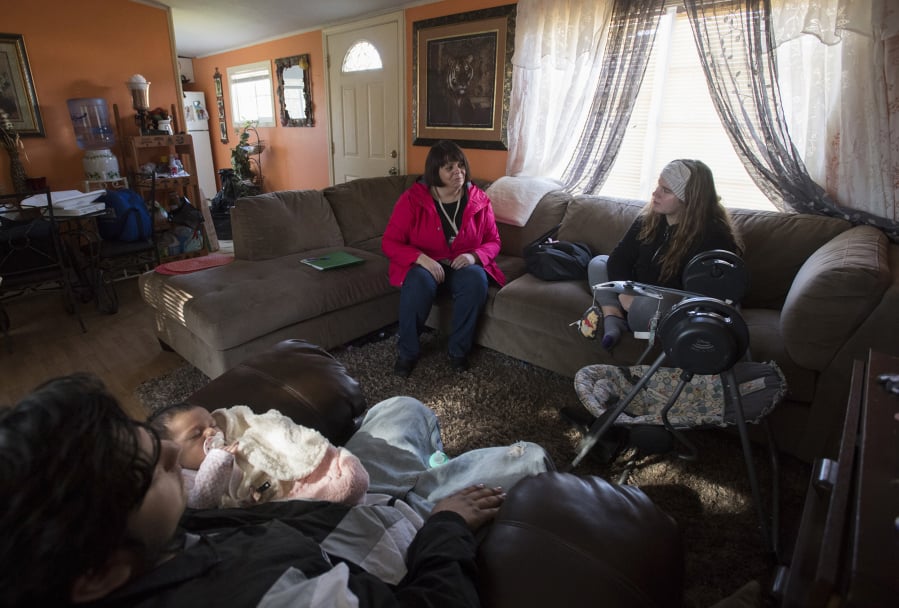RIDGEFIELD — About a week after Lela Garcia was born, her parents began to fear for her life.
Lela, who’s now 6 weeks old, accompanied her 16-year-old mom, Lisa Steele, in mid-January when she visited the PeaceHealth Southwest Medical Center emergency room for a problem. Later, they found out the day and time Steele and Lela visited the ER was during a possible measles exposure. Any spot or possible rash freaked Steele out.
“I was stressed,” Steele said from her house in Ridgefield.
“I was worried and scared, because I heard the baby could die,” said her boyfriend, Kevin Garcia, 18.
Clark County Public Health contacted the parents and gave Lela immunoglobulin, an antibody that can protect against measles. That was the start of how Steele, Garcia and Lela have been intertwined in the county’s measles outbreak, which so far has tallied more than 60 confirmed cases, caused more than 750 pupils to miss school and cost the county more than $500,000 to fight. The total cost across the state has surpassed $1 million, according to The Seattle Times.
Those are the quantifiable costs of the outbreak, but Steele, Garcia and Lela are now encountering the intangible costs.
They participate in Clark County Public Health’s Nurse-Family Partnership, which pairs parents and children with a nurse through the first two years of the child’s life. The program helps low-income first-time parents navigate parenthood. But right now the four NFP nurses have been shifted from their normal roles to help with outbreak response.
Last week, Anne Johnston, the NFP nurse paired with the family, visited for the first time in nine days. Johnston generally tries to see newborns once a week, but since the outbreak she has only a day or a day and a half per week to see clients. Some clients she can see in person only on a biweekly basis now.
Since the outbreak started in January, Johnston has also had seven clients deliver babies.
“You have to make choices about which clients you can see in person,” Johnston says. “You always worry if you don’t see them on a regular basis, will you lose track of them? Will they still stay engaged with you in the future? Lives are busy, and if you get out of your routine sometimes it’s hard to get back to it.”
The four nurses have the capacity to serve about 95 women, but only have between 80 to 85 women in the program currently, according to Public Health. Johnston said she can’t take on new clients at the moment.
“We have people waiting,” she said.
She’s prioritizing newborn clients, and gets creative to keep in touch with clients. Instead of in-home visits each week, she can give her families a video call or telephone call. She’s usually not great at texting, she said, but that’s changed during the outbreak.
Sometimes Johnston gets home from an eight- or nine-hour day of working on the response effort, and spends another two hours responding to texts and calls from parents.
“You don’t get to see them as often as they’re accustomed to,” Johnston says. “And not maybe as often as what’s required by the program, so you try to meet their needs in these other ways. … I try to make sure, somehow, someway, I fit them in.”
During their visit last week, Johnston walked the parents through what they’ll experience in a couple weeks at Lela’s two-month checkup. She mentioned Lela will likely get six vaccinations.
“When you vaccinate, you’re not just protecting yourself,” Johnston said.
“You’re protecting others,” Steele interjected.
Johnston also measured and weighed Lela. She’d grown 2 inches to 22 inches and went from 9.8 pounds to 10.1 pounds since the last time Johnston took those measurements.
Johnston discussed Steele returning to work for the first time since Lela was born. Steele and Garcia both work, and Steele does online classes through Vancouver Home Connection at Lieser Campus. Steele was nervous about being away from her baby for an extended period of time.
Garcia promised he’d text pictures of Lela to Steele throughout her workday.
“It’s only four hours, but it’s still four hours,” Steele said.
“That’s always a hard transition, the first time you have to leave your baby,” Johnston added.




